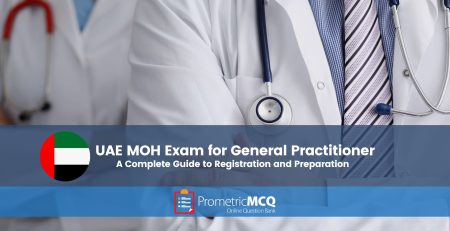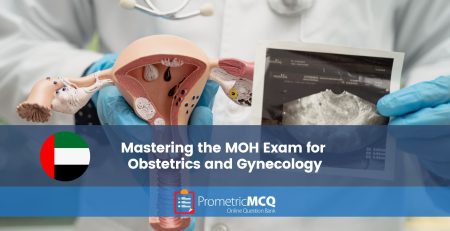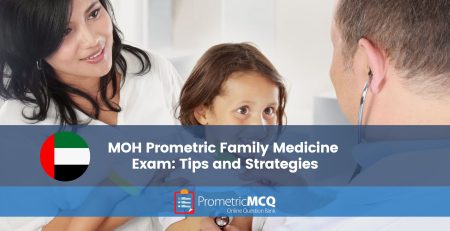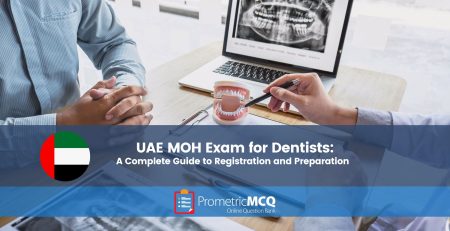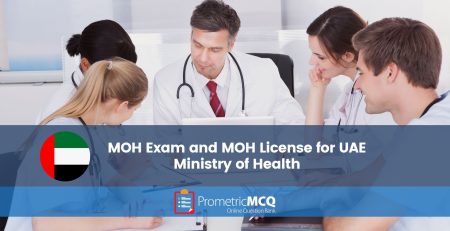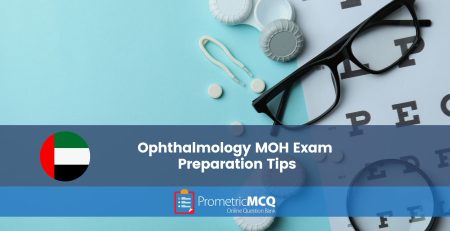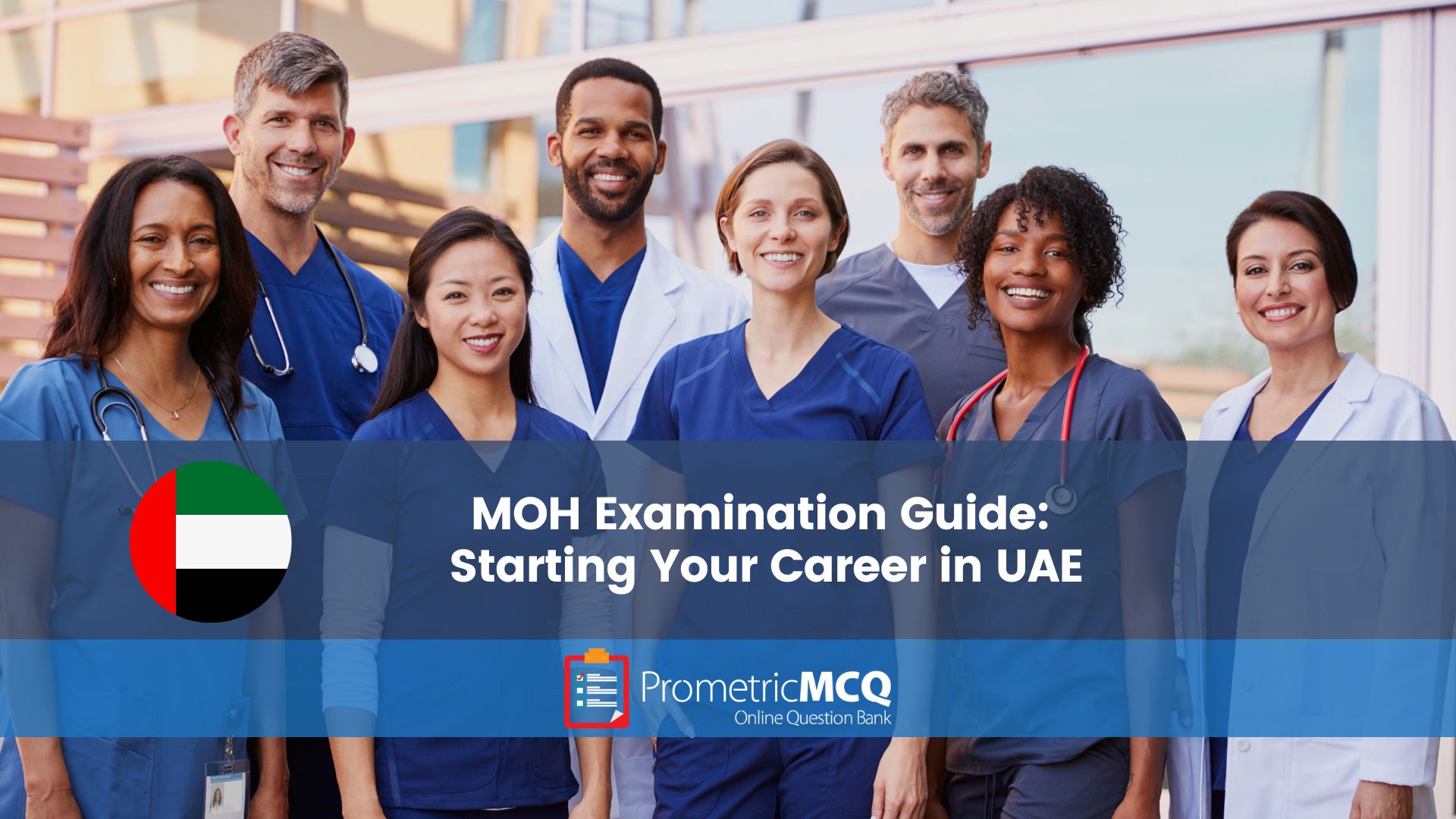
MOH Examination Guide: Starting Your Career in UAE
Webmaster2024-04-01T14:24:45+00:00Are you a medical professional looking to advance your career and practice in the UAE? Look no further than the Ministry of Health (MOH) Examination. This comprehensive exam is a crucial step towards obtaining a license to practice in one of the most prestigious healthcare systems in the world.
In this blog post, we will cover everything you need to know about the MOH Examination, from eligibility criteria to study tips and beyond. Get ready to take your career to new heights with our expert guidance!
Table of Contents
ToggleIntroduction to the MOH Examination
The Ministry of Health (MOH) examination is a standardized test that assesses the knowledge and skills of healthcare professionals in various medical fields. It is an essential requirement for those who wish to practice medicine in countries like Qatar, Saudi Arabia, Oman, and the United Arab Emirates.
The MOH examination is designed to ensure that healthcare professionals possess the necessary competencies to provide high-quality care to patients. It evaluates both theoretical knowledge and practical skills, making it a comprehensive assessment tool for medical professionals.
MOH Exam Eligibility Criteria
To be eligible for the MOH examination, candidates must meet certain criteria set by each country’s respective health ministry. Generally, applicants must have completed their undergraduate or postgraduate education from a recognized institution and hold a valid medical license in their home country.
MOH Exam Format
The MOH examination consists of two parts – written and practical. The written exam comprises multiple-choice questions (MCQs) covering topics related to the candidate’s field of expertise. The number of questions and duration may vary depending on the specialty being tested.
The practical MOH exam assesses candidates’ clinical skills through various stations simulating real-life scenarios. This part of the exam tests candidates’ ability to diagnose and manage different cases correctly.
Preparation Tips
Preparing for the MOH examination requires dedication and hard work as it covers a vast amount of material. Here are some tips that can help you ace this challenging exam:
- Understand The Exam Format: Before starting your preparation, familiarize yourself with the exam format, including its structure and content distribution.
- Create A Study Plan: As there is a lot of material to cover, creating a study plan will help you stay organized and focused on your goals.
- Utilize Reliable Resources: Make use of reputable resources such as textbooks recommended by experts or previous years’ question papers to aid your preparation.
- Practice With Sample Questions provided by PrometricMCQ.com: Solve as many sample questions as possible to get a sense of the types of questions that may appear in the exam.
- Join Study Groups: Collaborating with other candidates can be beneficial as you can discuss and learn from each other’s strengths and weaknesses.
The MOH examination is a crucial step for healthcare professionals seeking to practice in countries where it is a mandatory requirement. It evaluates their knowledge, skills, and competence to ensure they meet the standards set by the respective health ministries. With proper preparation and dedication, passing this exam should not be a daunting task.
What is the Purpose of the MOH Examination?
The Ministry of Health (MOH) examination is a standardized test that is administered by the Ministry of Health in various countries, including the United Arab Emirates and Saudi Arabia. This examination is a crucial step for healthcare professionals who are looking to practice in these countries. The MOH examination assesses the competency and knowledge of medical professionals in their respective fields.
The primary purpose of the MOH examination is to ensure that all healthcare professionals who wish to work in these countries meet the minimum standards set by the Ministry of Health. This ensures that patients receive high-quality care from competent and qualified healthcare providers. By passing this exam, healthcare professionals are granted permission to practice medicine within their specialty in these countries.
Additionally, the MOH examination serves as a means of regulating the influx of foreign medical practitioners into these countries. With an increasing demand for medical services, it has become necessary for regulatory bodies like the MOH to implement strict measures to ensure that only qualified individuals enter their workforce. As such, passing this exam proves one’s eligibility to work in these countries as a licensed healthcare professional.
Another essential purpose of the MOH examination is to maintain high standards of healthcare delivery within these nations. The exam covers a wide range of topics and assesses not only theoretical knowledge but also practical skills and clinical reasoning abilities. This ensures that those who pass possess up-to-date knowledge and skills required to provide effective and safe patient care.
Furthermore, passing the MOH examination also opens up opportunities for career advancement for medical professionals. In addition to obtaining licensure, successful candidates may have access to better job prospects with higher salaries and benefits compared to non-licensed practitioners.
Moreover, taking part in this rigorous exam allows medical professionals to stay updated with advancements in their field through studying for it. This continuous learning helps enhance their skills and knowledge base, which ultimately translates into better patient outcomes.
Understanding the purpose behind the MOH examination highlights its importance for healthcare professionals seeking to practice in countries where it is required. It serves as a quality assurance measure, ensures regulation of the workforce, maintains high standards of healthcare delivery, and provides opportunities for career advancement. Therefore, preparing for and taking this exam is essential for any medical professional looking to work in the United Arab Emirates or Saudi Arabia.
Eligibility Criteria for Taking the MOH Exam
The Ministry of Health (MOH) examination is a necessary step for healthcare professionals who wish to work in the United Arab Emirates (UAE). In order to be eligible to take the MOH exam, there are certain criteria that must be met. These requirements ensure that only qualified individuals are able to practice medicine and provide quality care to patients in the UAE.
- Education and Experience: The first eligibility criteria for taking the MOH exam is having a valid medical degree from a recognized institution. The candidate must also have at least two years of post-graduate clinical experience or one year of internship training after obtaining their medical degree.
- Good Standing Certificate: All candidates must obtain a Good Standing Certificate from their country of origin or any previous countries they have practiced in. This certificate should confirm that the candidate has no previous malpractice or disciplinary actions against them.
- Language Proficiency: Since the MOH exam is conducted entirely in English, it is essential for candidates to have proficient English language skills. This includes both written and spoken communication abilities, as well as comprehension skills.
- Home Country Medical License: In addition to having a valid medical degree, candidates must also hold an active license from their home country or any previous countries they have practiced in.
- MOH Exam Preparation Course: Candidates who do not meet all of the above eligibility criteria may still be able to sit for the MOH exam by completing a mandatory preparatory course organized by approved training institutes in the UAE.
- Valid Passport: It is important for candidates to have a valid passport with at least six months before expiration as this will be required during registration for the MOH exam.
- Application Process: To apply for the MOH exam, candidates must submit a completed application form, along with all necessary documents and fees. The application process may vary depending on the candidate’s profession, so it is important to check the specific requirements for each category.
Meeting the eligibility criteria for taking the MOH exam is crucial in order to work as a healthcare professional in the UAE. By ensuring that candidates have the necessary education, experience, language proficiency, and other qualifications, the MOH exam helps maintain high standards of medical practice in the country. It is important for individuals interested in working in the UAE healthcare sector to carefully review and fulfill these criteria before applying for the MOH examination.
MOH Exam Format and Structure
The MOH (Ministry of Health) examination is a comprehensive test that assesses the knowledge and skills of healthcare professionals seeking to practice in the United Arab Emirates. This exam is required for all medical, dental, and pharmaceutical practitioners, as well as nurses and allied health professionals who wish to work in the UAE.
To help you prepare for this important examination, it’s crucial to understand the format and structure of the MOH exam. In this section, we will delve into the details of how the exam is structured and what you can expect on test day.
MOH Exam Format: The MOH examination consists computer-based test (CBT) MOH Prometric Exam.
It’s worth mentioning that all healthcare professionals, regardless of their specialty, are required to take the same CBT test. However, the practical/clinical assessment is tailored according to each profession’s specific job requirements.
Understanding the format and structure of the MOH examination is essential for proper preparation and success on test day. It’s crucial to familiarize yourself with these details before taking the exam so that you can approach it with confidence and perform at your best.
Preparation Tips for the MOH Exam
Preparing for the MOH (Ministry of Health) exam can be a daunting task, especially for those who are taking it for the first time. It is a crucial step towards securing a job in the healthcare sector in countries like Saudi Arabia, Oman, and Qatar. The exam covers multiple areas of medical knowledge and requires thorough preparation to pass. To help you prepare effectively, here are some tips that you can follow:
- Understand the Exam Format:
The first step towards preparing for any exam is to understand its format thoroughly. The MOH exam consists of 150-200 multiple-choice questions covering various topics such as medicine, pediatrics, surgery, obstetrics and gynecology, psychiatry, community health, laboratory sciences and radiology. Each question has four options with only one correct answer. Familiarizing yourself with this format will help you strategize your study plan accordingly. - Make a Study Plan:
With such vast syllabus to cover, it is essential to have a structured study plan in place. Divide your time wisely between different subjects based on their weightage in the exam and your level of proficiency in each subject. - Utilize Study Materials:
There are several reference books available to help you prepare for the MOH exam such as Prometric review books or online resources like MedQuestUSMLE and Medical e-books library that provide comprehensive study materials specifically designed for this examination. - Practice with Previous Years’ Question Papers:
Solving previous years’ question papers not only gives you an idea about the type of questions asked but also helps you manage your time better during the actual test. - Give Importance to Anatomy & Physiology:
Anatomy & Physiology is a significant part of the MOH exam as it includes basic concepts that form the foundation of other subjects like medicine and surgery. Therefore it’s vital to give extra attention while studying this subject. - Revise Regularly:
Revision is the key to retain what you have learned. It’s advisable to revise each subject at least 2-3 times before the exam, with a quick revision of all subjects a week before the test. - Take Mock Tests:
Mock tests are an excellent way to assess your preparation level and identify weak areas that need more attention. Additionally, it helps you get familiar with the exam pattern, build your confidence, and improve your time management skills. - Stay Calm and Focused:
Last but not least, staying calm and focused during preparation is crucial. Avoid last-minute cramming as it can lead to confusion and anxiety. Instead, take breaks in between study sessions to keep your mind fresh.
Preparing for the MOH exam requires dedication, hard work, and a well-planned strategy. With proper planning and following these tips, you can increase your chances of passing this examination with flying colors!
MOH Exam Passing Score and Results
The MOH examination is a rigorous test that evaluates the knowledge and skills of healthcare professionals in various medical disciplines. It is designed to ensure that those who pass possess the necessary qualifications and competencies required to practice in their respective fields. In this section, we will discuss the passing score and results of the MOH examination.
Firstly, it’s important to note that the passing score for the MOH examination varies depending on your profession and specialty. For example, a general practitioner may have a different passing score than a nurse or pharmacist. The Ministry of Health determines these scores based on various factors such as the level of difficulty of the exam, industry standards, and current healthcare trends.
To achieve a passing score in the MOH examination, candidates must obtain at least 60% or above in each section. This means that even if you excel in one section but fail to meet the minimum requirement in another, you will not be considered as having passed the exam. Therefore, it is crucial to prepare thoroughly for all sections of the MOH examination.
Once you have completed your exam, it typically takes around 6-8 weeks for your results to be published. You will receive an email notification from Prometric with instructions on how to access your results online through their website. It is essential to keep yourself updated during this period by regularly checking your email and spam folder.
The results are presented as either “pass” or “fail,” without any specific numerical grade given. If you pass, congratulations! You can now proceed with applying for your professional license from the Ministry of Health in Saudi Arabia. However, if you fail to achieve a passing score, don’t be disheartened; you can retake the exam after three months from your initial attempt.
It’s important to note that retaking an exam comes with its own set of challenges. Not only do you have limited time for preparation, but you also have to pay the full exam fee again. Therefore, it is crucial to take your time and prepare thoroughly for the MOH examination to avoid any delays or additional expenses.
Achieving a passing score in the MOH examination requires dedication, hard work, and thorough preparation. It is essential to familiarize yourself with the exam format and content, as well as understand the passing score requirements for your profession and specialty. With proper preparation and determination, you can pass the MOH examination and take a step closer towards realizing your career goals in Saudi Arabia’s healthcare industry.
Career Opportunities After Passing the MOH Exam
Passing the MOH examination opens up a world of career opportunities for healthcare professionals. This prestigious certification, recognized by the Ministry of Health in various countries, is highly valued and sought after by employers in the healthcare industry. In this section, we will discuss some of the most lucrative and rewarding career paths that are available to individuals who have successfully passed the MOH exam.
- Healthcare Practitioner: One of the most obvious career options after passing the MOH exam is becoming a healthcare practitioner in your chosen field. Whether you are a physician, nurse, dentist or pharmacist, having an MOH License will make you stand out among other candidates and increase your chances of being hired in top hospitals or clinics.
- Government Positions: With an MOH License, you become eligible to apply for various government positions such as medical officer, public health specialist or healthcare administrator. These roles offer job security and competitive salary packages.
- Private Sector Jobs: Many private sector companies also prefer hiring individuals with an MOH certification due to their specialized skills and knowledge. You can find employment opportunities in pharmaceutical companies, insurance firms, research organizations and more.
- Teaching Opportunities: If you have a passion for teaching and mentoring future healthcare professionals, then passing the MOH exam can open up doors for you to become an instructor at universities or training institutions offering courses related to your field of expertise.
- Career Advancement Options: Passing the MOH exam not only opens up new job opportunities but also presents avenues for career advancement within your current workplace. Employers often provide incentives such as promotions or higher salaries to employees who have obtained this prestigious certification.
Passing the MOH exam can pave the way for a successful career in the healthcare industry. It not only validates your skills and knowledge but also demonstrates your commitment to providing high-quality healthcare services. With diverse job opportunities and potential for growth, obtaining an MOH certification is a wise investment in your professional development.
Challenges and Tips for Retaking the MOH Exam
Despite diligent preparation, it is not uncommon for healthcare professionals to fail the MOH exam on their first attempt. Whether due to nerves, lack of familiarity with the format, or simply not studying the right material, failing the MOH exam can be a frustrating experience. However, it is important to remember that this setback does not define your abilities as a healthcare professional.
Here are some common challenges faced by those retaking the MOH exam and tips to help you overcome them:
- Overcoming Self-Doubt: One of the biggest challenges for individuals retaking the MOH exam is overcoming self-doubt and maintaining confidence in their abilities. It is natural to feel discouraged after failing an exam, but it is important to stay positive and focus on improving weak areas.
Tip: Develop a study plan that targets your weaker areas while also reviewing topics you already have a good understanding of. This will give you a sense of progress and help build your confidence.
- Time Management: Another challenge when retaking the MOH exam is managing time effectively during the actual test. Many candidates struggle with completing all questions within the allocated time frame.
Tip: Practice answering questions under timed conditions before sitting for the real exam. This will help improve your speed and accuracy.
- Identifying Knowledge Gaps: Often times, failing an exam can highlight gaps in our knowledge that we were previously unaware of. In order to pass on your second attempt, it is crucial to identify these knowledge gaps and work on filling them.
Tip: Review feedback from previous attempts or consult with peers who have successfully passed the MOH exam for insights into which areas need more attention.
- Avoiding Burnout: Preparing for any major examination can be mentally taxing and exhausting. When retaking an exam, candidates may feel additional pressure which can lead to burnout if proper self-care is not practiced.
Tip: Take breaks when needed and engage in activities that help you relax and recharge, such as exercise or spending time with loved ones. Maintaining a healthy work-life balance will improve your overall well-being and enhance your performance on the exam.
In addition to these challenges, it is important to remember that every individual’s experience with the MOH exam may be different. What worked for someone else may not necessarily work for you. Therefore, it is crucial to develop a personalized study plan and seek guidance from experienced peers or professionals who can provide valuable tips and advice.
Remember, failing an exam does not define your capabilities. Use your previous attempt as a learning experience and implement these tips to increase your chances of success on the next try. With determination, hard work, and proper preparation, passing the MOH exam is achievable.
Conclusion: Is the MOH Examination Right for You?
The MOH (Ministry of Health) examination is a comprehensive assessment that evaluates the knowledge, skills, and competency of healthcare professionals seeking to work in the United Arab Emirates (UAE). It is a mandatory requirement for all healthcare practitioners who wish to practice in the country, including doctors, nurses, pharmacists, dentists, and allied health professionals. In this concluding section of our blog post on “Everything You Need to Know About the MOH Examination”, we will discuss whether taking this exam is the right choice for you.
Firstly, it is important to understand that the MOH examination can be quite challenging and requires thorough preparation. The exam covers a wide range of topics related to your specific field of expertise and may also include case-based scenarios that assess your clinical decision-making skills. Therefore, if you are someone who prefers hands-on learning rather than theoretical exams, then this may not be an ideal choice for you.
Secondly, it is crucial to assess whether working in the UAE aligns with your career goals and aspirations. While there are numerous opportunities available in the country’s growing healthcare sector, it may not be suitable for everyone. Some factors to consider include cultural differences, language barriers (Arabic being the official language), cost of living, and adapting to a new environment.
On the other hand, if you are looking for international exposure and experience working in a diverse setting with advanced medical facilities and technology, then taking the MOH examination could open doors for you. The UAE has a high demand for skilled healthcare professionals due to its rapidly growing population and increasing number of world-class hospitals. This presents an attractive opportunity for individuals seeking career growth and development.
Moreover, passing the MOH examination also allows you to apply for employment in any Emirate within UAE without having to take additional licensing exams or undergo further assessments. This provides flexibility in terms of job opportunities and location choices.
However, it is essential to note that the MOH examination has a limited validity of 3 years. After this period, you will need to renew your license by meeting certain requirements set by the UAE health authority, such as continuing education and practice hours. Therefore, if you are looking for a long-term career in the country, you must be prepared for ongoing professional development.
Whether or not the MOH examination is right for you depends on your individual goals, preferences, and career aspirations. It is a rigorous assessment but can open doors to exciting opportunities in one of the fastest-growing healthcare industries in the world. We hope this blog post has provided comprehensive information about this exam and helped you make an informed decision about your future plans. Best of luck!
Commonly Asked Questions in the MOH Exam
The MOH examination is a mandatory exam for healthcare professionals who wish to practice in the United Arab Emirates. It is a standardized test that assesses the knowledge and skills of medical professionals in their respective fields. Like any other exam, there are certain common questions that arise among candidates regarding the MOH examination. In this section, we will address some of these commonly asked questions to help you better understand the exam.
The MOH examination consists of multiple-choice questions (MCQs) and practical or clinical assessments depending on your profession. The MCQs cover topics related to your field of expertise, while the practical assessment evaluates your hands-on skills.
For the UAE MOH (Ministry of Health) examination, medical professionals are generally allowed three attempts. This rule applies across the various health authorities in the UAE, including the Dubai Health Authority (DHA), the Department of Health (DOH or HAAD), and the Ministry of Health (MOH). The MOH license is particularly relevant for professionals seeking to work in the five Emirates of Sharjah, Ajman, Umm Al Quwain, Fujairah, and Ras Al Khaimah.
The MOH examination involves a computer-based test and, for certain professionals, an oral assessment as well. If a candidate fails all three attempts, they are typically barred from reapplying for the same or a lower-level examination. This applies to various healthcare professionals, including nurses, pharmacists, and physicians.
It’s essential to note that specific details might vary depending on your profession. For example, dentists are allowed three attempts across the DHA, MOH, and DOH/HAAD examinations. After three unsuccessful attempts, a dentist must pursue additional training in a recognized specialty before reapplying for a higher-level exam.
The Ministry of Health provides a General Practitioner book as a reference material for all medical professionals appearing for the MOH exam. However, it is recommended to use additional resources such as textbooks and online courses to prepare thoroughly.
The MOH examination results are valid for two years from the date of passing. After that, candidates will have to retake and pass the exam again to obtain a valid license.
Prometric plays a significant role in the Ministry of Health (MOH) examinations, particularly for health professionals. Here’s a brief overview of their role:
Test Administration: Prometric administers and oversees the MOH examinations. They ensure the testing process is standardized, secure, and consistent across various locations.
Scheduling and Registration: Candidates who wish to take the MOH exam must register and schedule their exam through Prometric’s website. This system allows candidates to choose their preferred exam date and location, subject to availability.
Exam Development and Delivery: Prometric is responsible for the development and delivery of the exams in collaboration with the MOH. They ensure the exam content is relevant, up-to-date, and aligns with the MOH’s standards and requirements for healthcare professionals.
Technical and Logistical Support: They provide technical and logistical support before, during, and after the examination. This includes ensuring that the computer-based testing systems are functioning properly and providing assistance to candidates as needed.
Result Processing and Reporting: After the exam, Prometric processes and reports the results to both the candidates and the MOH. They ensure the accuracy and confidentiality of the results.
Overall, Prometric’s role is crucial in maintaining the integrity and quality of the MOH examinations, which are designed to assess the competence of healthcare professionals seeking to practice in various countries.
To apply for the Ministry of Health (MOH) examination, typically the following criteria must be met:
Educational Qualifications: A relevant degree in a healthcare field (like medicine, nursing, dentistry, or pharmacy) is required.
Professional Licensing: Candidates should be licensed or registered with a medical council or equivalent authority in their home country or the country where they obtained their qualifications.
Clinical Experience: A certain amount of post-qualification clinical experience is usually required, with the specifics depending on the healthcare field and the country’s MOH.
Good Standing Certificate: This certificate, issued by the medical council or licensing authority where the applicant is currently registered, attests to their professional conduct.
It’s important to check the specific eligibility criteria for the MOH exam of the particular country, as these requirements can vary.
The structure of the Ministry of Health (MOH) examination typically includes the following components:
Computer-Based Test (CBT): This is the primary component of the MOH exam. It consists of multiple-choice questions covering various topics relevant to the candidate’s healthcare field. The CBT assesses theoretical knowledge, practical skills, and the ability to apply this knowledge in a clinical setting. The number of questions and duration of the test can vary depending on the specific healthcare profession and the MOH’s guidelines.
Oral Assessment (For Some Professions): In addition to the CBT, some healthcare professionals might be required to undergo an oral assessment. This is more common in fields where practical skills and patient interaction are crucial, such as in medicine or dentistry. The oral exam typically involves a panel of examiners who assess the candidate’s clinical reasoning, decision-making skills, and ability to communicate effectively with patients and colleagues.
Each MOH may have specific formats and guidelines for these assessments, so it’s important for candidates to familiarize themselves with the details provided by the MOH for which they are taking the exam.
Yes, dataflow verification, or primary source verification (PSV), is a required step for the MOH exam. This process involves the verification of various documents, including:
- Educational Degrees: Ensuring that the degrees held by the applicant are authentic and issued by accredited institutions.
- Training Certificates: Verifying any additional training or specialized education the applicant has completed.
- Experience Certificates: Confirming the work experience claimed by the applicant, typically including the roles held and duration of employment.
The purpose of dataflow verification is to ensure the authenticity and validity of the information provided by candidates. It helps maintain high standards and integrity in the healthcare profession, ensuring that all professionals practicing under the MOH’s jurisdiction meet the necessary qualifications and experience requirements.
PrometricMCQ.com provides a range of comprehensive support services for candidates preparing for the MOH exam, including:
Dataflow Verification Assistance: They help candidates with the primary source verification process, ensuring that their educational degrees, training certificates, and experience documents are properly verified.
Exam Booking: Assistance is offered in scheduling and booking the MOH exam through Prometric, making the registration process smoother for candidates.
Study Materials: They provide specialized study materials tailored to the MOH exam’s syllabus, aiding candidates in their preparation.
License Renewal Services: For healthcare professionals who need to renew their MOH license, PrometricMCQ.com offers guidance and support in completing this process.
Coaching and Guidance: The platform also offers coaching services, including tips, strategies, and personalized guidance to help candidates effectively prepare for the exam.
These services aim to streamline the preparation and application process for the MOH exam, offering candidates a more structured and guided approach to their exam preparations.
Passing the Ministry of Health (MOH) exam primarily allows you to work in various healthcare settings within the northern emirates of the United Arab Emirates, such as Sharjah, Ajman, Ras Al Khaimah, Umm Al Quwain, and Fujairah. However, for Dubai and Abu Dhabi, which are the two largest emirates in the UAE, there are additional or different licensing requirements:
Dubai: To work in Dubai, healthcare professionals typically need to pass the Dubai Health Authority (DHA) exam.
Abu Dhabi: For Abu Dhabi, including Al Ain, professionals usually need to clear the Health Authority-Abu Dhabi (HAAD) exam.
Each of these exams – MOH, DHA, and HAAD – has its own set of regulations, eligibility criteria, and exam structure. It’s important to note that while there are efforts to unify healthcare licensing in the UAE with the introduction of the UAE Unified Healthcare Professional Qualification Requirements, it’s still advisable to check the current regulations and requirements of each specific emirate where you wish to work.
We hope that these frequently asked questions regarding the MOH examination have helped address some of your concerns. It is crucial to thoroughly understand the requirements and format of this exam before attempting it. Remember to prepare well and stay focused during the examination. Good luck!
Apply for UAE MOH License
Get UAE MOH Prometric Exam Preparation and Licensing Services

